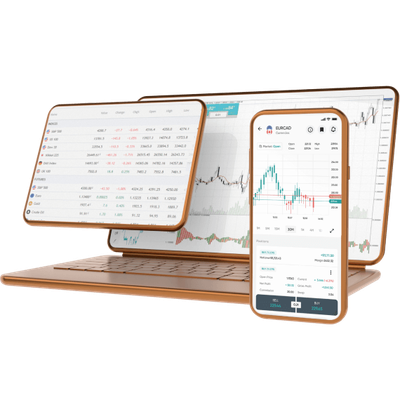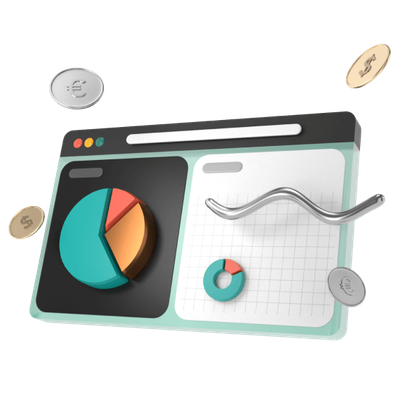Global forex trading at your fingertips
Trade on the world’s largest market with a huge collection of currency pairs like EURUSD, GBPUSD, USDJPY and AUDUSD.

We’ve packaged everything you need to trade forex online
Currency pairs
Spreads from 0.0 pips
Commission from $0
Leverage up to 1:400
Free research tools
Award-winning support
What are forex CFDs?
FX CFDs are contracts that are used to trade on currency pairs with added leverage. Online traders often choose CFDs as you can speculate on the rise or fall of an FX pair’s value - without directly owning it. “Forex” stands for “foreign exchange” (or currency pairs) and “CFDs” stands for “Contract for Differences”. Read more about these terms in our FAQs below.
The margins below only apply to MT4. We’ve introduced tiered margins on MT5. To learn more, see our Tiered Margins on MT5.
Major FX spreads
Go long or short on major currencies against the USD like EURUSD (Euro Dollar), USDCAD (Dollar Loonie) or GBPUSD (Pound Dollar).
Majors
| Currency pair | Typical Spread (Pips) On Our Standard Account | Typical Spread (Pips) On Our Premier Account | Fixed leverage | Margin |
|---|---|---|---|---|
| EURUSD | 1.4 | 0.0 | 1:400 | 0.25% |
| AUDUSD | 1.5 | 0.1 | 1:400 | 0.25% |
| EURCHF | 2.7 | 0.7 | 1:80 | 1.25% |
| EURGBP | 2.0 | 0.2 | 1:400 | 0.25% |
| EURJPY | 2.2 | 0.5 | 1:400 | 0.25% |
| GBPCHF | 3.8 | 1.2 | 1:80 | 1.25% |
| GBPJPY | 2.5 | 0.9 | 1:400 | 0.25% |
| GBPUSD | 2.2 | 0.2 | 1:400 | 0.25% |
| NZDUSD | 2 | 0.4 | 1:400 | 0.25% |
| USDCAD | 2 | 0.4 | 1:400 | 0.25% |
| USDCHF | 2 | 0.3 | 1:400 | 0.25% |
| USDJPY | 1.4 | 0.0 | 1:400 | 0.25% |
Minor FX spreads
Trade the price swings of powerful currencies in pairs that don’t include the US dollar - such as EURGBP, GBPAUD and CHFJPY.
Minors
| Currency pair | Typical Spread (Pips) On Our Standard Account | Typical Spread (Pips) On Our Premier Account | Fixed leverage | Margin |
|---|---|---|---|---|
| AUDCAD | 2.6 | 1.1 | 1:400 | 0.25% |
| AUDCHF | 2.2 | 0.8 | 1:80 | 1.25% |
| AUDJPY | 2.3 | 1 | 1:400 | 0.25% |
| AUDNZD | 2.9 | 1.1 | 1:400 | 0.25% |
| CADCHF | 2.7 | 1.3 | 1:80 | 1.25% |
| CADJPY | 2.4 | 1.2 | 1:400 | 0.25% |
| CHFJPY | 3.2 | 1 | 1:80 | 1.25% |
| EURAUD | 2.5 | 1.3 | 1:400 | 0.25% |
| EURCAD | 3.4 | 0.7 | 1:400 | 0.25% |
| EURNZD | 3.2 | 1.7 | 1:400 | 0.25% |
| GBPAUD | 5.2 | 1.7 | 1:400 | 0.25% |
| GBPCAD | 5.1 | 1.7 | 1:400 | 0.25% |
| GBPNZD | 5.2 | 2.3 | 1:400 | 0.25% |
| NZDCAD | 3.1 | 1.1 | 1:400 | 0.25% |
| NZDCHF | 4.6 | 1.1 | 1:80 | 1.25% |
| NZDJPY | 2.5 | 1.1 | 1:400 | 0.25% |
Exotic FX spreads
These might be traded less often, but trading major currencies against emerging markets can create huge price swings - and returns!
Exotics
| Currency pair | Typical Spread (Pips) On Our Standard Account | Typical Spread (Pips) On Our Premier Account | Fixed leverage | Margin |
|---|---|---|---|---|
| AUDSGD | 6.8 | 1.5 | 1:40 | 2.5% |
| CADSGD | 6.8 | 2 | 1:40 | 2.5% |
| EURMXN | 159.2 | 88.9 | 1:40 | 2.5% |
| EURNOK | 145.3 | 72.8 | 1:40 | 2.5% |
| EURPLN | 26.2 | 23.4 | 1:40 | 2.5% |
| EURSEK | 75.3 | 42.5 | 1:40 | 2.5% |
| EURSGD | 3.8 | 1.8 | 1:40 | 2.5% |
| EURZAR | 63.1 | 63.1 | 1:40 | 2.5% |
| GBPNOK | 148.4 | 118.5 | 1:40 | 2.5% |
| GBPSEK | 85.3 | 70.7 | 1:40 | 2.5% |
| GBPSGD | 4.8 | 2.4 | 1:40 | 2.5% |
| GBPZAR | 3.8 | 1.2 | 1:40 | 2.5% |
| MXNJPY | 100.3 | 80.3 | 1:40 | 2.5% |
| NOKJPY | 22.4 | 22.2 | 1:40 | 2.5% |
| NOKSEK | 28.1 | 25.5 | 1:40 | 2.5% |
| NZDSGD | 3.2 | 2 | 1:40 | 2.5% |
| SEKJPY | 20.4 | 20.2 | 1:40 | 2.5% |
| SGDJPY | 3.0 | 1.6 | 1:40 | 2.5% |
| USDMXN | 121.3 | 552.9 | 1:40 | 2.5% |
| USDNOK | 121.3 | 108.2 | 1:40 | 2.5% |
| USDPLN | 26 | 8.8 | 1:40 | 2.5% |
| USDRUB | 278.3 | 105.3 | 1:40 | 2.5% |
| USDSEK | 72.6 | 33.2 | 1:40 | 2.5% |
| USDSGD | 3.1 | 1.2 | 1:40 | 2.5% |
| USDZAR | 140.8 | 71 | 1:40 | 2.5% |
| XAUEUR | - | - | 1:400 | 0.25% |
| XAGEUR | - | - | 1:80 | 1.25% |
| XAGUSD | - | - | 1:80 | 1.25% |
| XAUUSD | - | - | 1:400 | 0.25% |
FX trading hours
Liquidity and spreads can change due to market conditions, spreads are variable and can widen overnight. The information in these tables is correct at the time of publication, we reserve the right to change its contents at any time. For live updates please refer to your trading platform or call +254 730 676 002.
Sunday: 21:01 - 24:00 GMT
Mon-Thurs: 00:00-20:59 and 21:05-24:00 GMT
Friday: 00:00 - 20:57 GMT
Please note that USDRUB is set to close only and is not available for trading at any of the times listed above.
*Average prices are during London and New York sessions.
**Trading hours can change due to public holidays, we’ve listed additional market closures on our Holiday Hours page.
Forex FAQs
1. What is forex & how do I trade FX pairs?
Forex (‘foreign exchange’ or ‘fx’) describes trading currencies in pairs, like EURUSD, on a decentralised over-the-counter global market. This allows traders to potentially profit from the increased (or decreased) value of a country’s currency in comparison to another. Each currency has an official abbreviation - in this case, EUR means ‘Euro’ & USD means ‘United States Dollar’.
When trading forex online, your bid price or ‘base currency’ is shown first (here as EUR) and is followed by the ask price or ‘quote currency’ (here as USD). The values of these currencies change quickly which is reflected in the spread, i.e. the difference between bid & ask price.
You can trade online on the performance of currency pairs by opening a single position on a secure trading platform - we offer 3 to choose so you can trade forex on mobile, tablet or desktop.
2. What is a ‘pip’ in forex trading?
A pip, short for ‘point in percentage’, is a very small measure of change in the value of a currency pair on the foreign exchange (forex) online market. It can be measured in terms of the quote or the underlying currency. It is a standardised unit for the smallest amount by which a currency quote can change, which is usually $0.0001 for USD-related currency pairs. A fractional pip or point is equivalent to 1/10 of a pip and there are 10 points to every 1 pip.
When trading forex, spreads with low pips (0.0 pip spreads) indicate that a product is traded very frequently but pips can also be used for risk management tools like Stop Loss orders.
Knowing your currency pair’s pip value allows you to manage your risk exposure, and potentially make the same profit across pairs. For example, if your Stop Loss equals 50 pips, the Take Profit should be 100-150 pips - as many think that having a SL/TP ratio of 1:2 or 1:3 is a good benchmark.
3. What’s the main difference between forex CFDs and pure forex?
CFD (or ‘Contract for Differences’) trading involves different types of contracts covering a diverse set of financial instruments such as indices - whereas forex refers to pure currency pair trading.
Another way of looking at it is that pure forex is mostly driven by global events & CFDs are mostly impacted by the supply/demand of the performance of the forex pairs, which means that with a forex CFD you can open on a position that will profit from either the increase or decrease in a currency pair’s price.
Both pure FX pairs and FX CFDs can be affected by multiple factors or impacted by unprecedented events. There is no fixed guide to trading, so we always recommend to seek independent advice and to keep a close eye on all your open trades.
4. What is leverage & how do I use it?
We offer leverage through the use of margins, where we provide borrowed funds from our deep liquidity pool to increase your trading position. This means traders can increase their market exposure by paying a fraction of their initial investment (their deposit).
In practice, 1:20 leverage means you can invest $10 and trade with $200 - allowing for higher potential gains AND losses. Make sure you understand your risk appetite. Try to minimise your losses by using Stop Loss tools or other risk management strategies - or experiment with leverage on our risk-free demo if you haven’t traded with it before.
We offer up to 1:400 leverage on selected products including precious metals, gold, oil & natural gas commodity CFDs.
5. What is a ‘stop loss’ order & why should I use it?
Arguably the most popular tool for reducing risk, stop loss orders are designed to limit loss on a security position that’s made an unfavourable move. When you place a stop loss order with a broker, you’re requesting to close the position once the instrument reaches a certain price. This is helpful as it means your trades need less monitoring and can help to limit losses, particularly in volatile markets.
Please also note that a stop loss is by no means a guarantee, positions may be affected by price gaps over market closures, data release or other economic factors.


